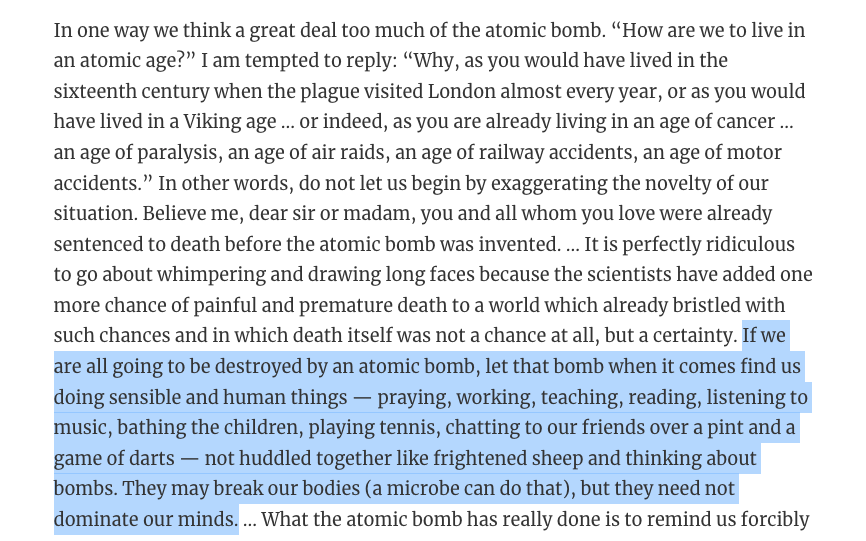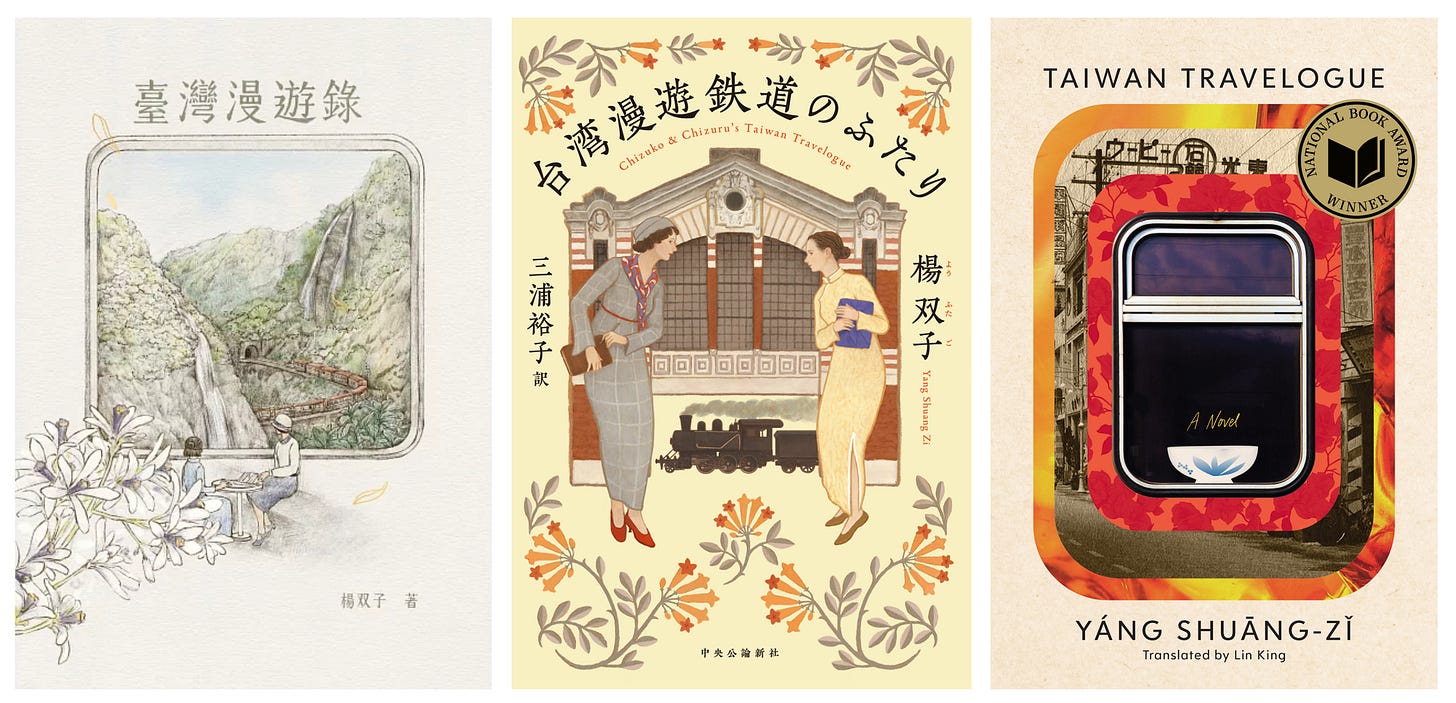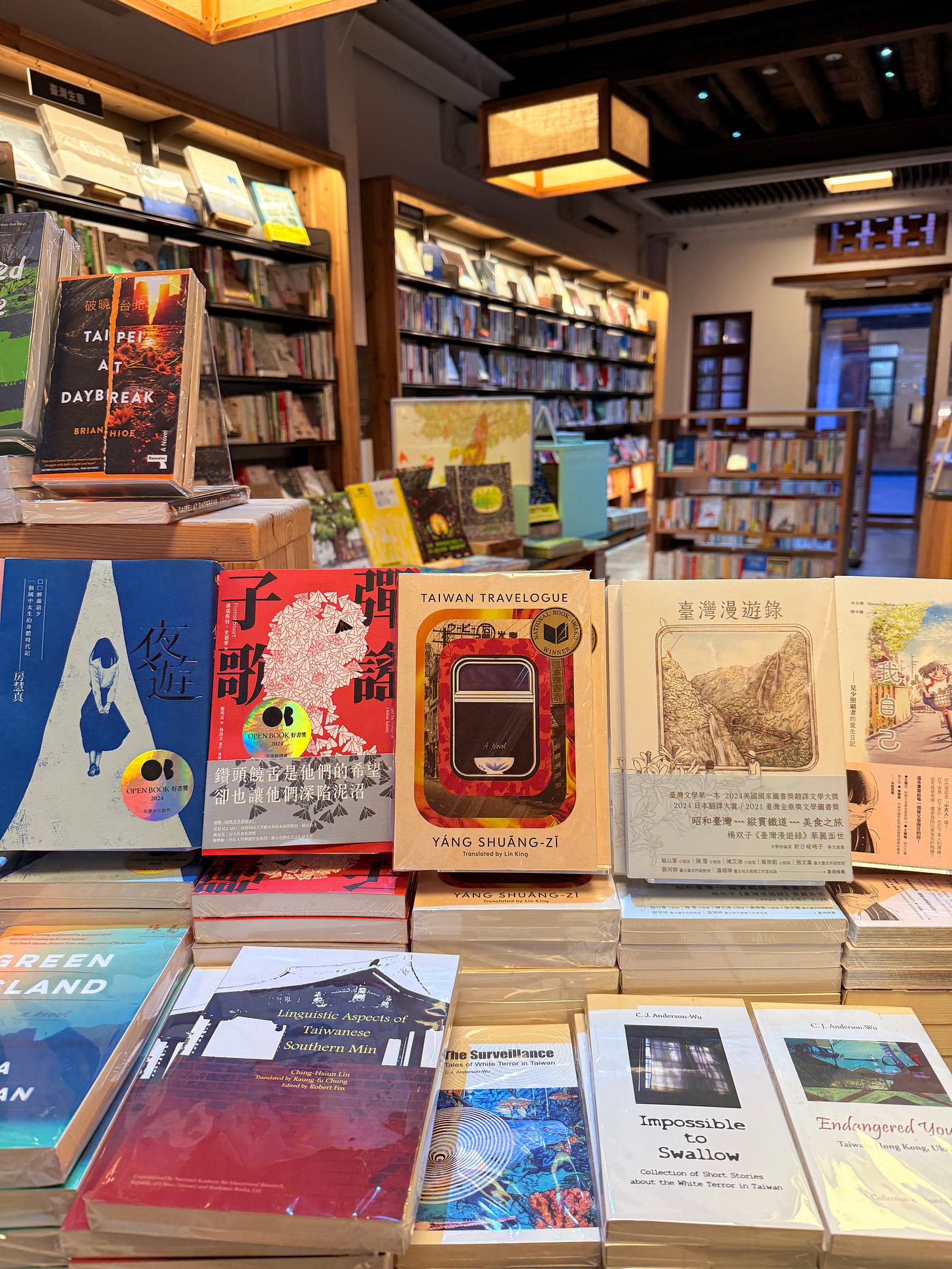In difficult times, we breathe and eat and read and laugh
TAIWAN TRAVELOGUE by Yáng Shuāng-zǐ, translated by Lin King, published by Graywolf Press, 2024
Welcome to Reading the (Un)Familiar, where Jin curates translated and diasporic literature to encourage us to read beyond the Anglosphere. Jin is currently reading contemporary feminist Korean writers, Asian/diasporic Asian writers, and other writers in translation (loosely defined).
I’ve been thinking about war these days, about living through times of great sorrow and violence. When I feel overwhelmed and overcome, I remember that war and violence has always happened, is always happening, and (unfortunately) will always happen, and that perhaps the only reason why I feel more overwhelmed now than I did perhaps a few years ago, is not because terrible realities didn’t exist then, but because I was simply unaware.
Remembering the ubiquity of terrible things does not undermine the terrible-ness of it all, but it helps me, at least, to recenter myself and think purposefully about how I want to spend my next 24 hours of limited attention, thought, and action. This quote from C.S. Lewis’s essay, “On Living in an Atomic Age,” written post-WWII has been circulating online, and I’ve been thinking about it frequently these days.

On the topic of WWII — I’ve unintentionally found myself working on a number of projects related to 20th century wars over the past few years. I was never a WWII History Buff™ myself. I realize that for some, the Roman Empire is their overarching lens through which they view all of history/contemporary life, and for others, it’s World War II. I study history in a roundabout way in my academic discipline, admittedly in a segmented way as my keywords are more loose and thematic, looking at gender, race, identity, so on and so forth. I can get so focused on singular events of history that it’s clarifying whenever I have moments where everything suddenly clicks into place, like oh, everything was, is, and still continues to be connected.
My most recent WWII-themed project now is on prompting American university students to think beyond the U.S./Germany/France/Western countries’ war memories to understand how WWII affected countries in Asia, especially with the Japanese empire. What happened in Korea, Japan, China, Taiwan, Singapore, Hong Kong, the Philippines, etc. during the 20th century, pre/during/post-WWII? Working on this project made me understand a little bit of why some people can get deeply interested in learning about WWII — it truly was such a major event that changed everything for so many people and places. It’s difficult to even try to wrap my head around it — which is why I often opt to read historical literature rather than general textbooks, as I find that while textbooks provides sweeping overviews that are helpful for a general sense of the event, literature provides a focused deep dive into how such an event affected a certain handful of people at a certain time in the event, also providing an emotional connection to the event. (Pachinko by Min Jin Lee is a good example of this approach… and perhaps is why I love it so much.)
This brings me to today’s book recommendation: Taiwan Travelogue by Yáng Shuāng-zǐ, translated into English from Mandarin Chinese by Lin King, set in 1938 Taiwan a little bit before WWII, during the Japanese occupation of Taiwan (1895-1945). The book was originally written in Japanese by a Japanese writer (who is also the main character in the book, as this is a personal account) in 1954 and again in 1970. Its first translation was into Mandarin Chinese in 1990. The book was revived and republished in Taiwan in Mandarin Chinese in 2020 by Yáng Shuāng-zǐ, titled 臺灣漫遊錄. It was then translated into Japanese in 2023 by Yuko Miura, titled 台湾漫遊鉄道のふたり, and became the first Taiwanese work to win Japan’s Best Translation Award. Finally, the English translation titled Taiwan Travelogue was published in 2024 by translator Lin King and won the National Book Award.
The book’s translation trajectory is admittedly difficult to follow, but I mention it because its multiple translation iterations are a part of what makes this book such a spectacular and meaningful read — I’ll let you read it for yourself to understand why. I cried at the end of the story and then was absolutely mindblown at the ending translators’ notes. I skipped ahead to the translators’ notes before starting the book, but nothing made sense to me until I had finished the book in its entirety — it was a huge revelation!
There are multiple entry points for interested readers: Interested in travel? In learning about different foods? The two protagonists’ lives revolve around both themes. I initially envisioned penning this post about the protagonist’s stubborn insistence on being given access to local Taiwanese foods as she kept being fed Japanese food during her Japanese government-sponsored travels in Taiwan. (Something along the lines of “all she wants is Taiwanese food but she keeps given unagi!!”)
If you’re also interested in learning about history, colonialism, the depth and nuances of Japan’s colonization of Taiwan in the 20th century, how it affected Taiwan’s food, geography, media, language, schools, names, etc… This book taught me more about the historical relationship between Japan and Taiwan better than any history textbook ever did. (Another reason why this reminded me of Pachinko, which illustrated the colonial relationship between Japan and Korea on a micro/personal scale.)
The book also left me with a difficult question to ponder about how intimate/personal relationships can be made possible within the existence of power differentials. The story explores the relationship between a Japanese traveler in Taiwan and her Taiwanese translator and asks, subtly and directly, whether this relationship can ultimately be sustainable. All relationships inherently have power differentials written into them, often along lines of gender for heterosexual couples, sometimes along lines of race/ethnicity, sometimes language, sometimes ability, and other forms of privilege/power, all of these fluctuating based on our environment at a given time/place. I’m not of the opinion that power structures necessarily dictate our lives, as individuals surely have agency to act/react in all sorts of ways, but it is still true that macro structures such as war and colonialism affect us in the most intimate of ways.
To circle back to C.S. Lewis’s earlier point about going about our lives despite the threat of death, which has always existed — the protagonists of Taiwan Travelogue also illustrate how in difficult times, how life stops for some, how it goes on for others, how we continue to cook and eat nonetheless, how we travel, go to school, write and read books, form new friendships and families… how the difficult times are, yes, difficult, but they do not halt all forms of life as we continue to forge our days forward.
Anyway, I’ll leave you with a number of questions — I invite you to share your thoughts on whichever one speaks to you most! Do you have big historical moments that serve as a lens for you as you craft your understanding of the world? Perhaps it’s WWII, the Roman Empire, other colonial histories, the legalization of something significant, a religious history, significant environmental moments, etc. What is your philosophy of living through terrible times, present and past? What do you think about the crafting of intimate relationships across power differentials? Are there any other books you’d recommend to learn about important historical relationships? What are some other translated works that you’re reading lately?
And of course, I would love to hear from you if you’ve read this book (I know personally that a few of you are reading through it now!).
Thank you for reading, and until next time,
Jin






As always, I come away from reading your writing with so many thoughts! I’ve been fortunate enough to live a life largely sheltered from war, but growing up and now living in Cambodia I see the lingering effects of recent conflicts acutely on a daily basis. As an American citizen growing up here, it’s been interesting to learn about and navigate the difficult history of US involvement in the region and the ensuing instability. Learning the history of both “sides” of this story has been so insightful, and I agree that more than anything, personal accounts from those living during this time tend to stick with me much deeper than only history textbooks. Learning from voices around the world is so important and I’m so glad you’re drawing our attention to voices I might never otherwise hear!
Also, I’m halfway through reading Taiwan Travelogue (per your recommendation) and am loving it so far and learning so much. I don’t yet know what the ending holds but I can’t wait to finish it soon 🙂
So thought-provoking! I grew up in Japan around Japanese people who expressed deep remorse about Japan’s power and actions across Asia leading up to WWII. At the same time, my early education had a very Western-centric worldview—so I’ve ended up with this strange gap in my understanding of Japan’s colonization. A few years ago, I read Pachinko and found it incredibly moving, and I really appreciate this book recommendation as a way to further nuance my understanding of Japan’s relationship with Taiwan. It’s going to be my next read!